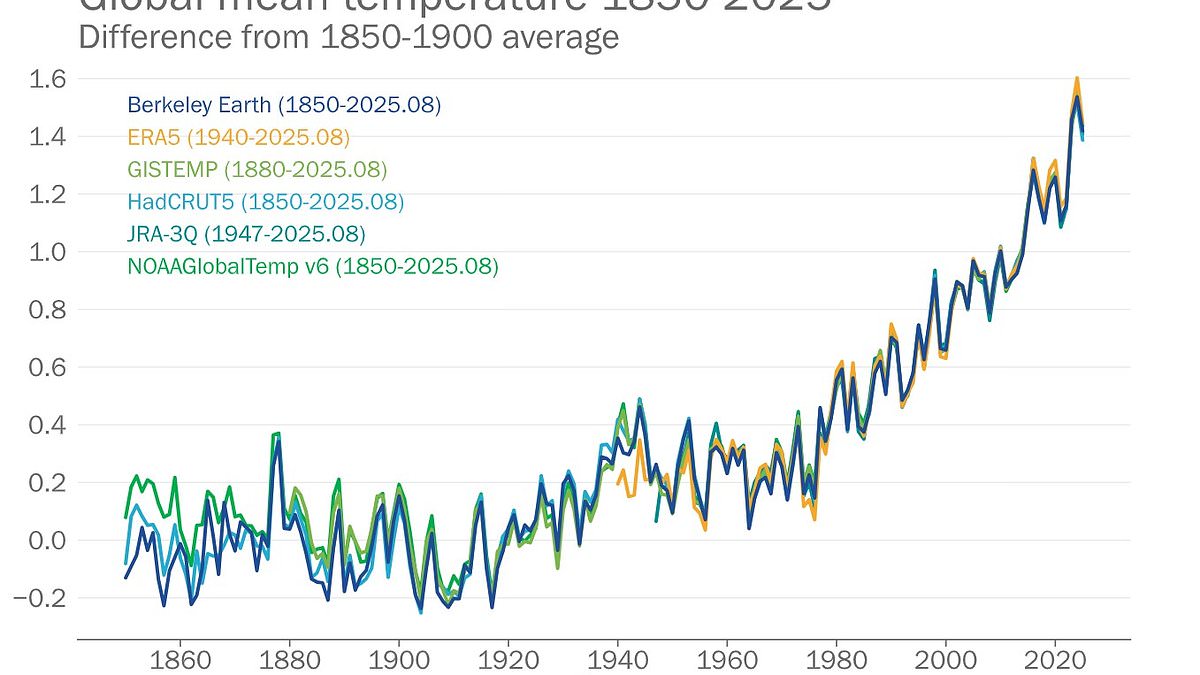Copyright dailymail

2025 is on track to be the second or third warmest year on RECORD – as scientists warn it's now 'virtually impossible to limit global warming to 1.5°C' READ MORE: Drop in air pollution has INCREASED global warming By WILIAM HUNTER, SCIENCE & TECHNOLOGY REPORTER Published: 14:00 GMT, 6 November 2025 | Updated: 14:00 GMT, 6 November 2025 With only two months of the year left, 2025 is on track to be the second or third hottest year ever recorded. A new report from the World Meteorological Organisation (WMO) found that record high concentrations of greenhouse gases are continuing to drive global warming. Between January and August, average temperatures were 1.42°C (2.56°F) warmer than during the 'pre–industrial' period between 1850 and 1900. Scientists warn that it will now be 'virtually impossible' to limit global warming to 1.5°C (2.7°F). This comes after 2024 smashed previous records for the hottest year ever, with average temperatures hitting 1.55°C above the pre–industrial average. There has now been a 26–month streak of record–breaking temperatures, with the sole exception of February 2025, which was only the third hottest ever recorded. That means the last three years have each been the hottest in the 176–year observational record. WMO Secretary General Celeste Saulo says: 'This unprecedented streak of high temperatures, combined with last year's record increase in greenhouse gas levels, makes it clear that it will be virtually impossible to limit global warming to 1.5°C in the next few years without temporarily overshooting this target.' Between January and August, average temperatures were 1.42°C (2.56°F) warmer than during the 'pre–industrial' period between 1850 and 1900. That is cooler than 2024 and 2023, but still one of the hottest years ever recorded 2025 is on track to be the second or third hottest year on record, as experts warn that it is now 'virtually impossible' to keep global warming below 1.5°C. Pictured: A section of the drought–stricken Negro River, Brazil Although the report found that 2025 looks likely to be cooler than 2024 and 2023, this is not because climate change has slowed. Instead, this temporary dip is because the world has moved from warming El Niño conditions into neutral or cooling La Niña conditions. In fact, the research suggests that climate change has continued almost unabated. During 2024, concentrations of the greenhouse gases carbon dioxide, methane, and nitrous oxide all reached record high levels. And measurements up to August suggest that levels in 2025 will be even higher. In 1750, prior to the Industrial Revolution, CO2 concentrations were at just 278 parts per million. Today, CO2 levels have increased by more than 50 per cent to 423 parts per million – with enormous consequences for the climate. Warming temperatures have led to melting polar icecaps, retreating glaciers, rising sea levels, and an increase in the severity of extreme weather events. These record temperatures come as the concentrations of greenhouse gases in the atmosphere continue to increase to their highest level Warming temperatures around the globe have contributed to the rapid melting of polar sea ice, the retreat of the world's glaciers, and an increase in global sea levels Hottest years on record 2024 – 59.18°F (15.10°C) 2023 – 58.96°F (14.98°C) 2016 – 58.66°F (14.814°C) 2020 – 58.65°F (14.807°C) 2019 – 59.60°F (14.78°C) 2017 – 58.50°F (14.723°C) 2022 – 58.42°F (14.682°C) 2021 – 58.38°F (14.656°C) 2018 – 58.35°F (14.644°C) 2015 – 58.34°F (14.637°C) (Average global air temperature for each month is in brackets) Source: C3S Advertisement Arctic sea ice extent after the winter freeze was the lowest ever recorded, at just 1.78 million square miles (4.6 million square kilometres). Likewise, Antarctic sea ice remained well below average throughout the year, dipping to its third–lowest winter maximum and summer minimum. 2023–24 was also the third year in a row that all global glacier regions showed a net loss in ice levels, contributing to the largest loss of ice on record. Estimates suggest that 450 gigatonnes of water were released by melting glaciers throughout the year, contributing 1.2 mm to global sea level increases. These worrying findings come ahead of the climate conference COP30 and on the tenth anniversary of the Paris Agreement, in which nations pledged to limit warming to 1.5°C. However, they also arrive after a year of devastating extreme weather events that scientists say have been made worse by climate change. Most recently, Jamaica was hit by the worst storm in the island's history as Hurricane Melissa left a trail of destruction across the Caribbean. Analysis by World Weather Attribution, an international consortium of scientists, found that climate change increased Melissa's wind speeds by seven per cent and extreme rainfall by 16 per cent. Arctic sea ice extent after the winter freeze was the lowest ever recorded, at just 1.78 million square miles (4.6 million square kilometres). Scientists warn that climate change has intensified extreme weather events all around the world. These included wildfires in Europe, flooding in Africa, and tropical storms throughout Asia Dr Samantha Hallam, an oceanographer from Maynooth University in Ireland, says: 'Warm ocean waters are the fuel for hurricanes, and the Caribbean has been warming around 0.2°C per decade since 1965. 'Ocean waters in the region were about 1.4°C warmer than the 1979–2000 average. Heart-stopping detail on live flight map near Hurricane Melissa's eye leaves viewers stunned 'That heat anomaly contributed to Melissa being roughly 40 mph stronger than it would have been under normal conditions – an increase that generated 1.6 times more destructive force and catastrophic damage across the island.' The WMO's report also warns that climate change has contributed to this year's extreme flooding in Africa and Asia, wildfires in Europe and North America, and extreme heat worldwide. Gareth Redmond–King, International Programme Lead at the Energy and Climate Intelligence Unit, says: 'Nations are gathering for the start of the COP30 climate summit at the end of a year that has seen devastating hurricanes, wildfires and flooding across the world; here at home, we've seen the second worst harvest as a result of climate change. 'Net zero emissions is the only solution we have to halt climate change, to limit the worsening danger and rising costs which this represents, and bring the climate system back into balance.' THE PARIS AGREEMENT: A GLOBAL ACCORD TO LIMIT TEMPERATURE RISES THROUGH CARBON EMISSION REDUCTION TARGETS The Paris Agreement, which was first signed in 2015, is an international agreement to control and limit climate change. It hopes to hold the increase in the global average temperature to below 2°C (3.6ºF) 'and to pursue efforts to limit the temperature increase to 1.5°C (2.7°F)'. It seems the more ambitious goal of restricting global warming to 1.5°C (2.7°F) may be more important than ever, according to previous research which claims 25 per cent of the world could see a significant increase in drier conditions. The Paris Agreement on Climate Change has four main goals with regards to reducing emissions: 1) A long-term goal of keeping the increase in global average temperature to well below 2°C above pre-industrial levels 2) To aim to limit the increase to 1.5°C, since this would significantly reduce risks and the impacts of climate change 3) Governments agreed on the need for global emissions to peak as soon as possible, recognising that this will take longer for developing countries 4) To undertake rapid reductions thereafter in accordance with the best available science Source: European Commission Share or comment on this article: 2025 is on track to be the second or third warmest year on RECORD - as scientists warn it's now 'virtually impossible to limit global warming to 1.5°C' Add comment



